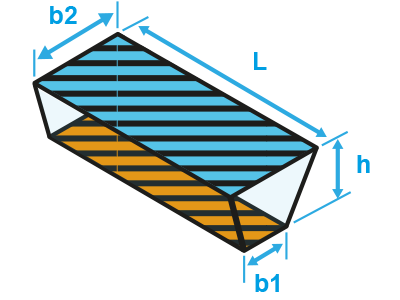External area (Water Overlay): Difference between revisions
Jump to navigation
Jump to search
No edit summary |
No edit summary |
||
| Line 3: | Line 3: | ||
|key=EXTERNAL_AREA | |key=EXTERNAL_AREA | ||
|unit=m² | |unit=m² | ||
|description=The surface area of the external water body behind the breach. The larger the external water body, the more water can flow from it (or into it), and the smaller the effect of the inflow or outflow of water on the external water level. | |description=The surface area of the external water body behind the breach. The larger the external water body, the more water can flow from it (or into it), and the smaller the effect of the inflow or outflow of water on the external water level. When provided with a second value, this key will also define a bottom area for the external water body, transforming its cross-section from a rectangle to a trapezoid. | ||
|defaultvalue=n/a | |defaultvalue=n/a | ||
|icon=waterwizard_icon_external_area.png | |icon=waterwizard_icon_external_area.png | ||
| Line 10: | Line 10: | ||
{{article end | {{article end | ||
|notes= | |notes= | ||
* When two values are set for this key, the first value will represent the surface area of the external water body and the second value will represent the bottom area of the external water body. The water body will be interpreted as a | * When two values are set for this key, the first value will represent the surface area of the external water body and the second value will represent the bottom area of the external water body. The water body will be interpreted as a trapezoidal prism, with a length set to the square root of the surface area. This will cause the water level of the external water body to change at a non linear rate. | ||
[[File:external_water_body_trapezoid.png|left|External water body as a trapezoid]]. | [[File:external_water_body_trapezoid.png|left|External water body as a trapezoid]]. | ||
* When a [[Breach_input_area_(Water Overlay)|breach input area]] is defined, an external water body will not be created. Subsequently, the [[External_surface_level_(Water_Overlay)|EXTERNAL_SURFACE_LEVEL]], [[External_water_level_(Water_Overlay)|EXTERNAL_WATER_LEVEL]] and [[External_area_(Water_Overlay)|EXTERNAL_AREA]] attributes will be ignored. | * When a [[Breach_input_area_(Water Overlay)|breach input area]] is defined, an external water body will not be created. Subsequently, the [[External_surface_level_(Water_Overlay)|EXTERNAL_SURFACE_LEVEL]], [[External_water_level_(Water_Overlay)|EXTERNAL_WATER_LEVEL]] and [[External_area_(Water_Overlay)|EXTERNAL_AREA]] attributes will be ignored. | ||
Revision as of 14:00, 19 June 2023
| Icon | Key | Unit | Range | Description | Default value |
|---|---|---|---|---|---|
| |
EXTERNAL_AREA | m² | The surface area of the external water body behind the breach. The larger the external water body, the more water can flow from it (or into it), and the smaller the effect of the inflow or outflow of water on the external water level. When provided with a second value, this key will also define a bottom area for the external water body, transforming its cross-section from a rectangle to a trapezoid. | n/a |
Notes
- When two values are set for this key, the first value will represent the surface area of the external water body and the second value will represent the bottom area of the external water body. The water body will be interpreted as a trapezoidal prism, with a length set to the square root of the surface area. This will cause the water level of the external water body to change at a non linear rate.

- When a breach input area is defined, an external water body will not be created. Subsequently, the EXTERNAL_SURFACE_LEVEL, EXTERNAL_WATER_LEVEL and EXTERNAL_AREA attributes will be ignored.




